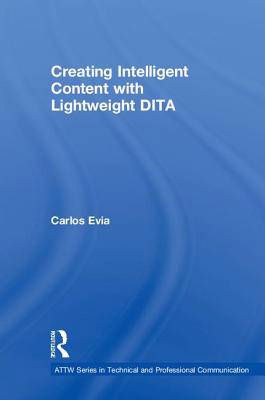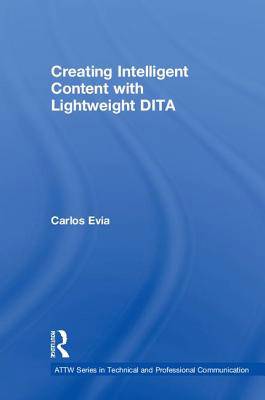
- Afhalen na 1 uur in een winkel met voorraad
- Gratis thuislevering in België vanaf € 30
- Ruim aanbod met 7 miljoen producten
- Afhalen na 1 uur in een winkel met voorraad
- Gratis thuislevering in België vanaf € 30
- Ruim aanbod met 7 miljoen producten
Omschrijving
Creating Intelligent Content with Lightweight DITA documents the evolution of the Darwin Information Typing Architecture (DITA) - a widely used open standard for structuring technical content. DITA has grown in popularity and features since its origins as an internal grammar for structuring technical documentation at IBM. This book introduces Lightweight DITA (LwDITA, which should be read as "Lightweight DITA") as a proposed version of the DITA standard that reduces its dependence on complex Extensible Markup Language (XML) structures and simplifies its authoring experience. This volume aims to reconcile discrepancies and similarities in methods for authoring content in industry and academia and does so by reporting on DITA's evolution through the lens of computational thinking, which has been connected in scholarship and media to initiatives for learning to code and programming.
Evia's core argument is that if technical communicators are trained with principles of rhetorical problem solving and computational thinking, they can create structured content in lightweight workflows with XML, HTML5, and Markdown designed to reduce the learning curve associated with DITA and similar authoring methodologies. At the same time, this book has the goal of making concepts of structured authoring and intelligent content easier to learn and teach in humanities-based writing and communication programs. This book is intended for practitioners and students interested in structured authoring or the DITA standard.
Specificaties
Betrokkenen
- Auteur(s):
- Uitgeverij:
Inhoud
- Aantal bladzijden:
- 236
- Taal:
- Engels
- Reeks:
Eigenschappen
- Productcode (EAN):
- 9780815393818
- Verschijningsdatum:
- 13/12/2018
- Uitvoering:
- Hardcover
- Formaat:
- Genaaid
- Afmetingen:
- 152 mm x 229 mm
- Gewicht:
- 485 g

Alleen bij Standaard Boekhandel
Beoordelingen
We publiceren alleen reviews die voldoen aan de voorwaarden voor reviews. Bekijk onze voorwaarden voor reviews.









